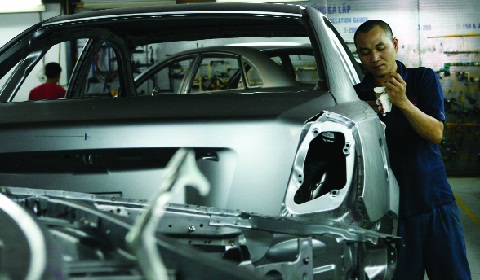Tall hurdles are taken in stride
Foreign direct investment hurdles will ultimately not deter investors from coming to Vietnam.
 Vietnam’s rich investment potential outweighs its obvious shortcomings |
For instance, a foreign investor needs to prepare 12 procedures and wait 94 days to establish a foreign-owned limited liability company in Vietnam. This is slower than 14 days in Malaysia, 34 days in Thailand, 46 days in India and 86 days in Indonesia, according to the report.
The slowness is due to a foreign company applying for approval from a city’s or provincial department of Planning and Investment to gain an investment certificate, which takes on average 57 days to obtain. Furthermore, the application has to include a specific business project, including a feasibility study and an environmental assessment.
Time to access industrial land is also a big challenge for foreign investors. According to the report, it takes 120 and 133 days to lease private land and public land respectively. Meanwhile, in Malaysia it is 13 days for leasing private land and 79 days for leasing public land, Indonesia (35 and 81 days), China (59 and 129 days) and Thailand (30 and 128 days).
While facing a long time to start a business and access industrial land, the foreign equity ownership is also limited. Only 18 out of 33 sectors are fully open to foreign investors in Vietnam and the lack of arbitral institutions and inefficient arbitration regime made arbitration a less popular option for foreign investors, said the report.
“The World Bank’s report is right, but it is not a comprehensive report,” said Hong Sun, general secretary at of the Korean Chamber of Commerce and Industry in Vietnam. Hong, also president of Korea’s HS Development & Construction Company, which is building an industrial park in Hanoi, said Vietnam’s investment climate had much improved, especially as the government was accelerating administrative reform through the so-called Project 30.
“Actually, Vietnam needs more efforts to enhance its business climate, but we should remember that no country can change the business climate immediately and Vietnam is just in the transitional period of administrative reform,” said Hong.
More foreign investors registering new projects in Vietnam since the country’s accession to the World Trade Organization in 2006 implies that international companies believe in Vietnam’s brighter investment climate.
Statistics from the Ministry of Planning and Investment’s Foreign Investment Agency show that foreign investors registered to invest in 839 new projects and expanded capital of 215 projects last year. In the first half of this year, foreign investors registered to invest in 438 new projects in Vietnam.
“The main reasons for investors to invest in Vietnam are an abundance of workforce and natural resources and market potential. Thus the restrictions, that are being removed, will not prevent investors from coming to Vietnam,” said Hong.
A recent Standard Chartered Bank report, named Vietnam-Rediscovering the Frontier, said that the structural fundamentals that caught investors’ attention to the country remained intact. Those include high economic growth, political stability, cheap labour and abundant resources.
What the stars mean:
★ Poor ★ ★ Promising ★★★ Good ★★★★ Very good ★★★★★ Exceptional
 Tag:
Tag:
Related Contents
Latest News
More News
- US firms deepen energy engagement with Vietnam (February 05, 2026 | 17:23)
- Vietnam records solid FDI performance in January (February 05, 2026 | 17:11)
- Site clearance work launched for Dung Quat refinery upgrade (February 04, 2026 | 18:06)
- Masan High-Tech Materials reports profit: a view from Nui Phao mine (February 04, 2026 | 16:13)
- Hermes joins Long Thanh cargo terminal development (February 04, 2026 | 15:59)
- SCG enhances production and distribution in Vietnam (February 04, 2026 | 08:00)
- UNIVACCO strengthens Asia expansion with Vietnam facility (February 03, 2026 | 08:00)
- Cai Mep Ha Port project wins approval with $1.95bn investment (February 02, 2026 | 16:17)
- Repositioning Vietnam in Asia’s manufacturing race (February 02, 2026 | 16:00)
- Manufacturing growth remains solid in early 2026 (February 02, 2026 | 15:28)
















 Mobile Version
Mobile Version